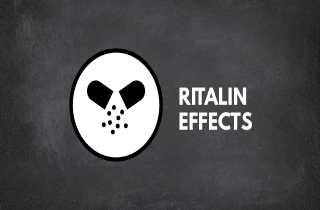Looking for a full review of how Ritalin can affect you? You’ve found it!
Here, we review some of the major positive AND negative effects Ritalin has on the brain and body. For example, Ritalin can be habit forming and cause both physical and psychological dependence. Then, we invite your specific questions about using Ritalin at the end.
Major Ritalin effects on the body
Ritalin (methylphenidate) is a powerful central nervous system stimulant which is used in the therapy of attention deficit disorder, hyperactivity and narcolepsy. Ritalin also has a potential for abuse and illicit forms of Ritalin constitute some of the most dangerous but widely used drugs of abuse. So what are some common adverse side effects than can occur while on Ritalin?
- motor tics or verbal tics
- muscle tightness
- numbness, burning, or tingling in the hands or feet
- numbness, pain, or sensitivity to temperature in the fingers or toes
- seizures
- uncontrollable movement of a part of the body
- weakness or numbness of an arm or leg
Ritalin effects on the brain
All stimulants work by increasing dopamine levels in the brain. Dopamine is a neurotransmitter associated with pleasure, movement, and attention. The therapeutic effect of stimulants is achieved by slow and steady increases of dopamine, which are similar to the way dopamine is naturally produced in the brain. The doses prescribed by physicians start low and increase gradually until a therapeutic effect is reached.
When taken in doses and via routes other than those prescribed, prescription stimulants can increase brain dopamine in a rapid and highly amplified manner (similar to other drugs of abuse such as methamphetamine), thereby disrupting normal communication between brain cells and producing euphoria and, as a result, increasing the risk of Ritalin addiction.
Some possible negative effects Ritalin can have on the brain include:
- damage to the brain including strokes and possibly epilepsy
- dizziness
- excessive tiredness
- headache
- permanent damage to blood vessels of brain
- slow or difficult speech
Ritalin effects on the nervous system
Ritalin is a piperidine derivative that is structurally related to amphetamine which acts as a central nervous system (CNS) sympathomimetic stimulant, probably by causing release of norepinephrine at CNS nerve terminals promoting neurotransmission. Ritalin may also affect dopaminergic neurotransmission. Therapy with Ritalin has been shown to increase cognitive abilities and improve psychological functioning and performance in children and adults with suspected attention deficit disorders. However, Ritalin users have also reported:
- feelings of agitation
- nervousness
Ritalin effects on personality and behavior
- abnormally excited mood
- bizzare, erratic, sometimes violent behavior
- feeling unusually suspicious of others
- mood changes
Ritalin effects on the mind
- believing things that are not true
- decreased sexual desire
- depression
- difficulty falling asleep or staying asleep
- disorientation, apathy, confused exhaustion
- drowsiness
- fainting
- hallucinations, hyper-excitability, irritability
- loss of appetite
- panic and psychosis
- psychosis
- restlessness
- strong psychological dependence
Ritalin effects on the heart
- increased heart rate
- permanent damage to blood vessels of heart
- sudden death in patients who have heart problems or heart defects
- stroke and heart attack in adults
Ritalin effects on blood pressure
- increased (high) blood pressure that leads to heart attacks, strokes and death
Ritalin effects on heart rate
Ritalin increases your heart rate. Your doctor should check your or your child’s blood pressure and heart rate regularly during treatment with RITALIN. Ritalin cause fast, pounding, or irregular heartbeat.
Ritalin effects on the liver
High doses of Ritalin can be associated with liver injury and distinctive forms of clinically apparent liver injury which has been most commonly associated with methylenedioxymetamphetamine (MDMA: “ecstasy”).
Ritalin effects on the lungs
- chest pain
- difficulty breathing or swallowing
- heartburn
- respiratory (breathing) problems if smoked
- shortness of breath
Ritalin effects on skin
- blistering or peeling skin
- hives
- itching
- rash
- skin color change from pale to blue to red in the fingers or toes
- unexplained wounds on the fingers or toes
Ritalin effects on sperm
- erection that lasts longer than 4 hours
- frequent, painful erections
Ritalin effects on women
Women represent a risk group for psychostimulant abuse because they respond more strongly, which is probably due to the influence of sex hormones.
Ritalin effects on pregnancy
There are not enough data on the use of ADHD medications in pregnancy to make a clear statement about their safety. However, in general, Ritalin should be used during pregnancy only if the potential benefit justifies the potential risk to the fetus.
Available evidence for amphetamines suggests no increased risk of malformations with use of therapeutic doses, and inadvertent exposure during pregnancy is unlikely to be harmful. Exposed infants might have slightly lower birth weights, but the clinical relevance of this is unclear.
Ritalin effects on the nose, ears, and throat
- destruction of tissues in nose if sniffed
- hoarseness
- swelling of the eyes, face, lips, mouth, tongue, or throat
Ritalin effects on eyes and pupils
- dilation of pupils
- changes in vision or blurred vision
Ritalin effects on stomach
- diarrhea
- stomach pain
- vomiting
- nausea









Related Posts